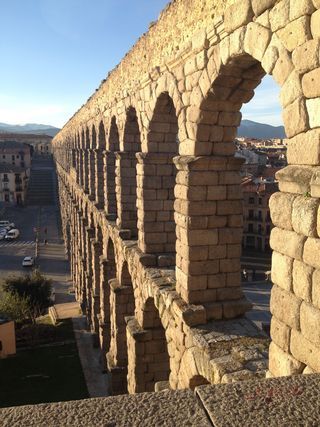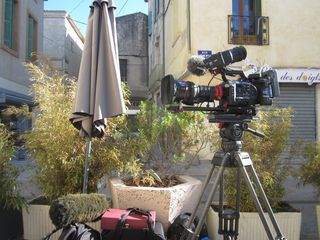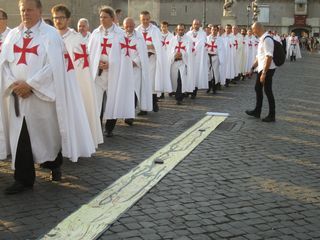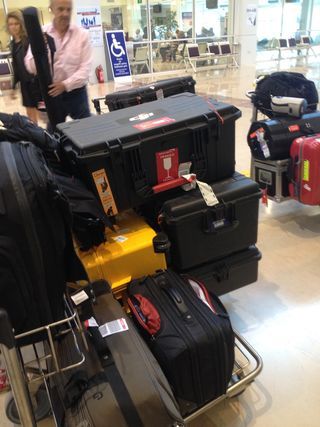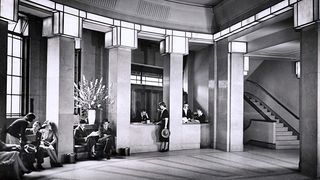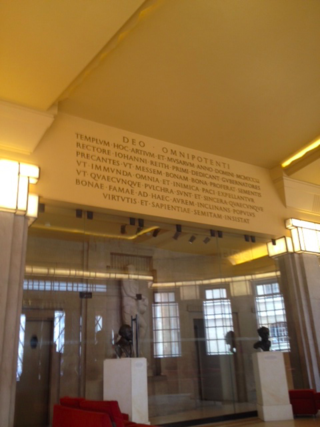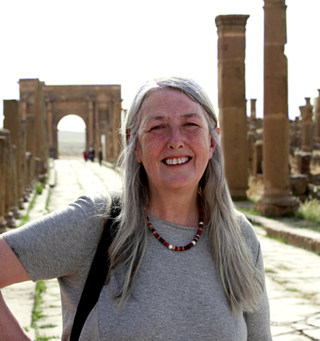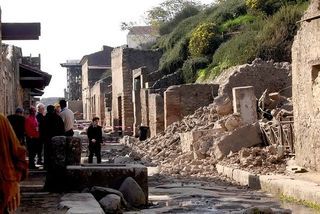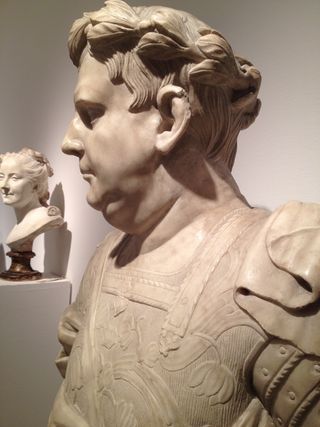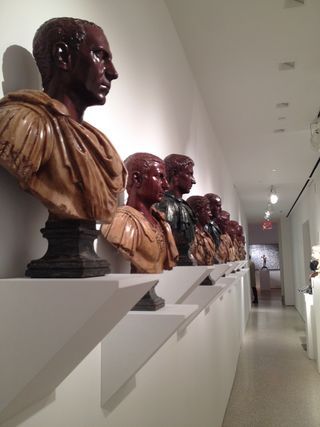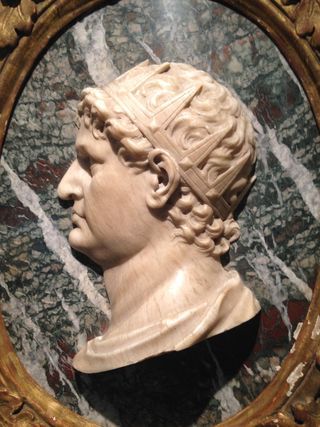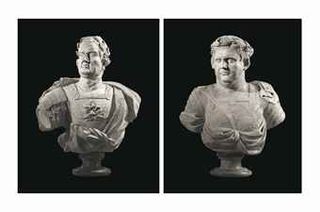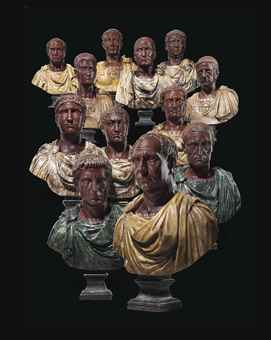Mary Beard's Blog, page 14
May 3, 2016
Ultimate Rome episode 2
So far, so good. That is to say (hooray!) people seem to have liked the first episode of Ultimate Rome. And A A Gill appears to be away, so no assaults from that quarter.
I feel a combination of pleasure and intense relief. I wrote a couple of weeks ago about the team work of a programme like this. What I didn't mention there much was the intellectual heavy lifting that goes into a programme like this -- all the problems of sharing the difficulties of understanding Roman history without making it look a hopeless pursuit, and the careful balance between some up-front myth busting and the nihilism of the extreme myth buster. I mean however little we think we know about ancient Rome, we know an awful lot more than we would ever expect. Who would ever have thought that we would still have a Roman general's own account of his campaigns (that's Caesar in Gaul), or the private letters of a leading politician stretching over most of his career (that's Cicero). True a lot of myths need busting, but a lot of extraordinary survivals need celebrating.
The big challenge of the first episode was to tell the story of 700 years of Roman history without turning it into a telegram or a series of battles. We did that by concentrating on a some key themes and some key characters, some well known, some far less famous. I feel especially pleased to have given Scipio Barbatus his five minutes in the limelight. But the decisions weren't easy. Someone tweeted to object to the omission of Crassus, someone else emailed to ask what had happened to the 'Struggle of the Orders'. Both are important. But the point was that we were focussing on the growth of the Roman empire and its consequences. So spending some time on Pompey captured the richness of the material and the extraordinary survivals of his power (I love the way that some of the buildings in the centre of Rome still reflect the layout of his vast urban development 2000 years ago and that we still have a big bronze jar which was carried in his triumphal procession). And it made some big points about the rise of one man rule.
The next episode (on Weds at 9.00pm) has a rather different focus, and different issues.
We're trying to look at the empire on the ground, at how it worked, at who powered it, and at the winners as well as the losers. It is hard to get the right balance here. I would be the last one to want to get up and celebrate the Roman empire unreservedly, but you just wouldnt get it right if you pretended that there weren't winners among the conquered. Roman roads are quite a good example of that. They connect the towns of Europe and beyond in ways that had never been attempted before (as the Life of Brian hinted it, the idea that you could get on a road in Rome and keep going until you got to Spain or Greece was wholly new). But you have to spare a thought for the victims too.. the poor peasants who woke up one morning to discover the bulldozers in their back garden and the equivalent of HS2 ploughing through their land.
One way we had of capturing this was to throw down the copy of an ancient Roman road map on a modern Roman bridge which caused among some (not others) quite a stir.
But ancient slavery is probably the trickiest topic. It is easy enough to deplore the cruelty, dehumanised instrumentality of it all, and actually quite chilling to recapture the idea of a consumer market in human beings. But it is a bit harder to do it without colluding in the sef-satisfied moral superiority of the modern world. It's awfully easy to feel better than the Romans without having to examine our own dehumanising instrumentalities too carefully.
How do we manage that? You'll have to watch, But in short the answer is HEAD ON.
Oh, just in case you wonder what travel is like with a TV crew, here is just a SMALL PART of our luggage. And yes it is easy to forget one bit, even if you think you have counted very carefully...as happened on one nightmare occasion in Rome. We were in serious disgrace with the producer till it turned up in Fiumicino's lost luggage!
April 30, 2016
BBC Latin
I have spent a bit of time in the last few months sitting in the entrance hall of Old Broadcasting House, the wonderful 1930s building that was the first monumental home of the BBC. It is (or was) a splendid welcome to the building. It has been very nicely restored, but you can't help noticing that it is now equipped with glass panels, security checks and revolving doors that stop any of the unauthorised just walking in. (The picture above manages cleverly to conceal most of that, but you can see the glass on the right.)
I fell to wondering a few weeks ago, as I was waiting there, what it would have looked like in Lord Reith's day. Well the answer is in the picture below, taken 1931.
It's almost identical, except that you could obviously just walk in, wave at the reception, and pop directly up the stairs (no visitor badge or whatever). And as someone I was talking to recently pointed out, whatever the cleanliness of the picture, it was presumably a complete fug of cigarette smoke in almost any period up to the 1990s.
But there's more to it than that. Not only are there the famous Eric Gill sculptures, but as I concentrated on it for the first time last week, I was struck by a long Latin inscription, just visible in the top picture.
Here you see it better (and you can also see how the Eric Gill sculpture is now cut off behind the glass). The text is quite easy, more or less biblical Latin:
DEO OMNIPOTENTI TEMPLUM HOC ARTIUM ET MUSARUM ANNO DOMINI MCMXXXI RECTORE JOHANNI REITH PRIMI DEDICANT GUBERNATORES PRECANTES UT MESSEM BONAM BONA PROFERAT SEMENTIS UT IMMUNDA OMNIA ET INIMICA PACI EXPELLANTUR UT QUAECUNQUE PULCHRA SUNT ET SINCERA QUACUNQUE BONAE FAMAE AD HAEC AVREM INCLINANS POPULUS VIRTUTIS ET SAPIENTIAE SEMITAM INSISTAT
or in English:
This Temple of the Arts and Muses is dedicated to Almighty God by the first Governors in the year 1931, John Reith being Director-General. It is their prayer that good seed sown may bring forth a good harvest, that all things hostile to peace or purity may be banished from this house, and that the people, inclining their ear to whatsoever things are beautiful and honest and of good report, may tread the path of wisdom and uprightness.
Not a bad text for the front hall of BBC HQ I thought. But who wrote it, with all those echoes of Paul's Letter to the Philippians?
It didnt take long to discover that it was one of the early governors, classicist and by then ex-headmaster on Winchester School, Montague Rendall. I confess I had never heard of him, but his entry in the Dictionary of National Biography conjures up a completely other world, though less than a hundred years ago."His educational ideal" it sharply put, "was a nebulous mixture of traditional Christian values (uncomplicated by any theology) and neo-medieval chivalry." "His vivid and dominating personality enabled him to communicate to the school his intense vision of the noblest aims in life." And in the well worn code, "resolutely unmarried".
But he could turn out some neat Latin and a still powerful "mission statement" for the BBC: "that the people, inclining their ear to whatsoever things are beautiful and honest and of good report, may tread the path of wisdom and uprightness". Taking away the whiff of 1930s piety, I could go along with that.
April 29, 2016
Unanswered questions and ex-prime-ministers
It is striking how prime-ministers tend to become much more impressive when they are ex-prime-ministers. It's not surprising, I guess. They were never stupid in the first place, and whatever ideological differences you might have with them, they were also almost too busy to think for themselves, and pressured by the party machine and the over-scrutiny of everything they say. Once out of office, they have time to think and freedom to say it. Even if you disagree with them, there tends to be at least a reflective argument with which you can engage. To put it another way, you only become a 'statesman' (or woman) after you have actually ceased to be an active one.
I thought exactly that about John Major on the Today programme this morning (it's at 8.10). I remember so vividly when he was my enemy number one. Here he was deftly puncturing the "faux-patriotic" mantras of the Brexit side, about Britain as some kind of victim of the EU. OK, you'll say, I just happen to agree with him for once. And I can't deny that must be part of it. But he was actually trying to put a bit of reflective complexity into the debate, especially on sovereignty -- an idea that is touted by the Vote Leave side as if it equated to Britain having the unfettered right to do whatever it fancied. Sovereignty is always shared, just as our own individual freedom of action and rights to self-determination is always a negotation with others. It's seriously misleading to suggest otherwise.
But I found myself thinking again this morning of the questions, beyond the slogans, that Brexit isn't even raising, let alone answering (unless I've missed it amongs all the speechifying). Like what do they actually plan to happen if we vote Out. To put it another way, we wake up on the morning of the 24 June to discover it's been a Brexit victory, then what?
I have two questions in particular.
First: why do they think that we could remain in a European free trade area (EEA/EFTA) and not also have to sign up to the free movement of labour. That's the deal that the much praised Norway has. In fact, Norway is not in the EU, but it is in the Schengen area, and in Brexit terms has no control of its own borders at all. What reason do they have for thinking that we would get a free trade deal entirely without 'strings'.
Second: what is the long term plan for those members of the EU who are already here? Is there to be a moritorium for them, with new regulations only coming in for new arrivals (quite difficult to police that one, I would have thought). Take one of my friends who works in television. She's Italian, been here 20 years and has contributed a great deal to the UK economy.Is she going to have to apply for a visa?
For me, it just wont do to say (as some were on Question Time last night) that we would wait for the referendum and then work out what to do. I want to know some of those details, or at least what the aim of the following negotiations would be, and some reason to think why they might be successful (not just 'Europe needs us').
April 23, 2016
Ultimate Rome and the team effort
My new Roman series start on BBC2 on Wednesday at 9.00. And it's a very funny feeling, a combination of anticipation, terror and nervous recollection. For a start, my main work on this -- in terms of filming -- was done months ago, last summer, and one thing's for sure: it cant be altered now. And the criteria of success are a bit fluid. One is the critical reaction. Do the reviewers, do my colleagues, like it? Two stars or four? But there's also how many people watch. It's not much good having a great critical response if the televisions dont get turned on. I wasn't exactly delighted to discover that it has been scheduled against Masterchef on BBC1 (but it could have been worse, it could have been Bake Off.
Anyway, the title is "Mary Beard's Ultimate Rome: empire without limit". The second part has already raised a few eyebrows. How could you imply the Roman empire didn't have boundaries, when self-evidently it did? In fact, as will come clear very soon into the series, the phrase "imperium sine fine"/"empire without limit" is taken from Jupiter's prophecy for Rome at the beginning of Virgil's Aeneid; it's Rome's ideological image of itself in the first century BCE, not the actuality.
But "Mary Beard's . . . "? One of my particular hopes is that the blazoning of the name of yours truly won't stop people taking a close look at the credits and at the names of all the other people who were all involved in making the programme.
Making television is extremely hard work. I dont regret doing it for a minute. I've seen all kinds of things that I wouldn't otherwise have seen, and I've had a chance to think about things, and how you can best present them, in all kinds of different ways too. But it isn't the glamour trip that people often think, and it depends not just on some starry (or not so starry) presenter, but 100% on collaboration -- directors, producers, sound and camera, not to mention all the editors, music makers and voice-over engineer after the filming's finished, as well as the people who organise the transport, book the hotels, and fix up all the permissions to film (which sounds easy, but I promise you isnt . . . you can't always get what you want, or at the price you can afford to pay).
If you came on one of our shoots (I couldn't possibly know if it is the same on others), what you would notice is that everyone really is in it together, 24/7. That goes from the soundman (who has to be listening to everything) saying gently on more than one occasion, "Mary, did you really mean to say...?" (or indeed "Mary, I dont actually think it's bronze..." whoops!), to the arguments playing out almost everybreakfast, lunch and dinner about how we are going to present the site or object we are looking at, and what I am going to say to make it come alive and also fit into the argument. Of course, we have a broad route map of the programme and of the series, but no detailed, word by word, script. Intentionally so, because it's only when you get somewhere that you can really work out how to make the place 'speak' on that occasion.
So please watch, and please don't switch off as soon those final credits appear, but keep them rolling right to the end.
April 21, 2016
Does it matter if a house at Pompeii falls down?
I am still getting emails, politely (mostly) objecting to what I said in Oxford a few weeks ago -- to the effect that the world wasn't going to stop if a house in Pompeii collapsed. It was when I was having huge fun getting my "Bodley Medal", and it was all accurately reported in the Telegraph. Accurately yes, but the reporting didn't quite capture the context or tone!
I was answering a good question from someone in the audience, asking what I thought about the damage that tourism did to Pompeii, and how we should manage that. The truth is that I have a fairly robust view of this. We do what we reasonably can to preserve the site (and no, we dont condone -- as some people thought I was saying -- any old visitor ripping off what they fancy). But we have to accept that ruins are ruins, and the iron rule is that they will get more ruined, especially when they were destroyed by a volcano in 79 CE and, let's not forget, seriously bombed by the allies in World War II.
One great thing about Pompeii is that one third of it is unexcavated, safe underground; and everyone, so far as I know, is committed to leaving it there for future generations to explore and analyse. The rest is inevitably fragile and we can delay its eventual collapse but not in the end prevent it. In the meantime I think we have to say that it is for us to study, explore, enjoy and share. If we have a responsibility to the past, that's it. And it seems to me that the worst outcome is that we should put a place like Pompeii in aspic and restrict access to the site to a few academics and (no doubt) to some of the privileged rich -- palming the rest of us off with a replica down the road.
There is a bigger point here though. I think it is very easy for us all to lament ruins falling down, or being destroyed (Palmyra is the obvious and tragic example, but there are plenty of others). That's 'news'. But the truth is that some of those who lament the loudest are those who were not the keenest to invest 'tax payers money' into archaeological research at home or abroad.
April 16, 2016
More or less?
There was a good letter in the Times today from a very smart woman -- Clarissa Farr, the High Mistress of St Pauls Girls School -- urging us to get Dads properly back into the family sphere, and to make work-place culture more family friendly for the blokes as well as the women. She is part of a campaign ("Dads for Daughters") which aims to address exactly that problem, and I am all behind it. But her letter started:"It's disappointing though not surprising that only 1 per cent of fathers have so far taken advantage of the new arrangements for shared parental leave."
I instantly knew that the estimable Ms Farr hadn't been listening to Radio 4's More or Less, presented by Tim Harford. Because a couple of week ago Harford had exploded this particular statistic, widely mis-reported, including now by Ms Farr. The 1% is correct, but it is 1% of men in the work force, not 1% of new fathers. Big difference. The take up rate for shared parental leave may still be lower than we might hope, but not as low as Ms Farr laments.
If you haven't caught up with this programme, then do. It's one of the most eye-opening things we have in the media right now. Its main aim is to analyse the statistical, and other "factual", claims you hear in politics, and test them/put them right. It has some sharp words for both sides of the Brexit debate (but certainly undermines the silly claims about children under eight not being allowed to blow up balloons in the new Europe). But its best bit of investigation is about cabbages.
There is an urban myth going around that the EU regulations on the sale of cabbages amount to 26,911 words (as against 66 words in the Lords Prayer). How bureaucratic is that Well very.. except it aint true. You can find the demolition of this here, or listen to the programme. But the gist is that there is no EU regulation on the sales of cabbages (specifically) whatsoever, and the mythical number 26,911 goes back to the 1950s in the USA and has nothing to do with the EU at all.
I cant resist asking: who would undermine such claims even-handedly if we didnt have the BBC?
April 13, 2016
The privileges of the rich: ancient Athens and now
I am a bit surprised that some Tory with a classical background has not sprung to David Cameron's defence, in his "wealthgate" troubles, with the obvious parallel from classical Athens. For it seems that, however radical the Athenian democracy may have been in the fifth century BCE (most major offices of state being chosen by lot), at least one position was always reserved for the wealthiest group of citizens -- the 'pentakosiomedimnoi', or the people whose land produced 500 measures of wet and/or dry goods. That was the office of "state treasurer".
There are all kinds of caveats here. By the fifth century BC that old category of 500-measure-men may not have meant much, and the state treasurers may not have had the power they once did. But the basic reason, as I was taught it, was that the Athenians assumed that it was better to entrust the highest state finances to the rich (who had less incentive to be on the fiddle) than to the poor.
We might be more cynical than the Athenians, who do not seem to have wondered whether some of the rich had been on the fiddle already (that was why they were rich?). But I was still half expecting some Boris-look-alike to jump up with this fifth century parallel in defence of those accounts.
As it is, we have been looking at an embarrassing and at times puzzling joust of special pleading on all sides. To take the side of the rich ministers, for once, from what we have seen so far, there is nothing illegal going on. Tax avoidance (legal) is not tax evasion (illegal), and you might say that only a mug does not take legal and prudent steps to minimise his or her tax liability. (Why give your kids gifts now that become liable to inheritance tax, when giving then a few years earlier would have made then exempt?)
But that isn't really why people have got angry, even if it has partly focussed rather imprecisely on that issue. It's surely because, legal or not, the gift of a couple of hundred thousand quid in a single year from mum to son (or a fee of a quarter of a million a year for a newspaper column) undermines the "we're all in it together" rhetoric of austerity or the sense that we are all taking the hit. We're not. If it would take you 10 years to earn that ��200k gift, you can't help seeing it as an 'us and them' issue.
The radically democratic Athenians might have had a residual respect for the probity of the rich. But we, for good reasons, don't.
April 9, 2016
The price of art
My visit to Christie's New York to look at the sculpture sale proved eye-opening in many ways. I had a good look at the pair of Caesars that were the real reason for my going. That's one of them above, looking rather grander in the picture than in real life. And I think I got a bit closer to the bottom of them. The sale catalgue tentatively identified him as Otho, but I am pretty certain that he is meant to be Domitian.
He derives ultimately from Sadeler's engravings of the 11 Caesars (later made up to canonical 12) that Titian did for the Gonzaga family at Mantua -- or, of course, from the Titian originals which were completely destroyed in a fire, having fetched up in Spain, in the eighteenth century (so Sadeler's engravings are our best guide). And although it is hard to be sure, Sadeler's Otho doesn't have a laurel wreath while his Domitian does, and he also has rather similar foliage on his breastplate, as well as a diagonal band across his chest. The closest match for this guy is actually in the Netherlands -- another Titian/Sadeler-inspired Domitian, in lead this time, now in the Rijksmuseum, which you can see here.
What interests me in all this is not so much the (mis)identifications, though I do intend to reflect on the floating identities of the Caesars through time. I'm keen to explore the way the same basic images (in this case Titian's original lost paintings) get replicated in different media: from painting to engraving to sculpture and sometimes to paintig again. So this will be a prime example for the book later.
But there was plenty of other things to look at too both in the sculpture sale and in some of the other sales currently on view.
That included the twentieth-century group of Twelve Caesars, above, that I had spotted in the catalogue (rather repellent as it turned out). And a rather more interesting relief, provisionally identified at Otho again in the catalogue, but my hunch is that it is Nero with that crown (though I havent yet checked the sources, and there is an Otho coin where he is sporting something similar).
But there were non Caesarian surprises too, including (in one of the other sales) this modern Sleeping Hermaphrodite in black marble by Barry X Ball, yours for something over half a million dollars (that's the lowest estimate).
It was the price that got me thinking though (any suggestions gratefully received). Who do we imagine is buying this stuff, for a very great deal of money? We'll find out next week what the hammer price on all these were. But who, with something between $80,000 and $120,000 to spare, is going to go back home (and to what sort of home?) with a set of twelve twentieth-century Roman emperor? And what do they think they are buying when they do that?
April 8, 2016
Women in the World
I have come to New York, first of all to give a talk at Tina Brown's Women in the World Summit (actually I did an 'interview with William Dalrymple that you will be able to find on the website I think, should you so choose). It's an amazing occasion, partly because it really is talking about women the WORLD OVER. I heard a horrifying account of the trouble of indigenous people in Canada, for example, as well as an interview with the Rula Ghani, wife of the President of Afghanistan ('First Lady', in other words), nicely resisting the assumption that Afghan women are 'victims' and an eye-opening panel discussion on what's happening to women in Turkey right now. In comparison with all this, my 'sex and trolls in ancient Rome' must have seemed a bit tame, or at least rather armchair safe!
But what struck me as the real selling point of the summit was the brilliant combination of mega celebrities (I shant forget saying hi to Christine Lagarde, who was on the stage before me) and women who don't usually make the international news (I sat at lunch next to a woman campaigning against gun violence in the USA, whose daughter had been killed in a random gun attack). Towards the celebrity end of the spectrum I suppose came the Bushes...ex-First Lady Laura, plus daughters Barbara and Jenna, who were interviewed together to remind us all that there women in the Bush family too. I wasn't quite sure of what to make of Laura's view that it was really helpful when you became first lady to have a mother in law who had also done the job (seemed to be an uncomfortable argument for keeping the presidency in the family). But I enjoyed seeing the grown up Jenna. All I had remembered about the Bush girls was them being what would have been called a bit of a "handful", and having a bit of a brush with the alcohol laws. It was hugely reassuring to see that Jenna in particular was still very engagingly up front!
But I have also been multi-tasking, with the Caesars.
The husband had noticed that a sale at Christie's New York on 13 April was featuring several Roman emperors (like the splendid seventeenth-century pair above, tentatively identified as Otho and Titus -- and interesting to me because they are much closer to the more characterful images you find in two dimensions than you usually find in sculpture).
So sadly in a way I am I am missing the group phot at the end of the summit and schlepping off to Christie's to see them. There is a rather extraordinary 20th century set of the Twelve that I also have my eye on.
Dont worry I shan't be coming home with a new objet d'art for the sitting room. It is all completely out of my price range!
April 3, 2016
Control of Our Own Borders?
I shall be voting "stay" in the EU referendum (it sounds more punchy than "remain"). I don't much like the arguments of fear on either side; neither has a monopoly on that, despite the rather desperate cat calls. And I wish that those leading the "in " campaign would lay out more of an ideological mission statement. Haven't they learned from the Scottish referendum that those arguing for the status quo run the real risk of losing unless they have a messianic rallying cry too?
Part of my reason is gut. Over the last few decades, the truth is that I really have begun to internalise a dual identity: I feel BOTH British AND European, and I dont see any real clash between them (that's a bit like the Roman model, I guess -- so far as we can tell, most citizens in the Roman world felt they 'belonged' both to Rome and to wherever it was they came from. That's not to say that I don't see problems with the EU. I'm as dissatisfied as anyone with the "democratic deficit". I don't like the voting system for the European parliament. And I dont think that it is entirely my fault that I dont know who my MEP/S is/are. That said, it feels like these are problems that I have to "own" and that I have a responsibility to do something about from the inside. It's a bit like saying that I wouldn't decide to emigrate to (say) New Zealand because I didnt like the UK's defence policy and austerity regime; I'd stay here and try to do something about it.
I also have real problems with many of the main planks of the "out" campaign, especially the mantra about controlling our own borders.
That's partly, to put it a bit plonkingly, because so many of the big issues that the world has to deal with seem supra-national (certainly supra the size of small nations within Europe). I mean by that issues of defence or pollution or the refugee crisis. It doesn't take much to see that the simple fact that Greece happens to be geographically nearest Turkey should not mean that it should deal single-handedly with all the migrants that end up on its islands; it's an obvious example where Europe has to think together, as it has so far only partly done; closing borders doesnt get us anywhere.
I am none too convinced either by the security angle of the attacks on Schengen. True, it is clear enough to see that no border checks on the roads between (say) France and Belgium must make it easier to drive with a car full of weapons and explosives from Paris to Brussels (though I have to say that my memory of border controls on trains across Europe, back in the day, were that they were perfunctory at best and would have required a vast increase in manpower to make reasonably efficient). But the Brits tend to forget that these are mostly LAND borders we are talking about. Unless we are planning on erecting walls between these European countries, with search lights, dogs and barbed wire (and please let's not), then anyone determined to cross doesn't have to do more than nip through the fields (which is how plenty of ammunition went from the Republic of Ireland to the north during The Troubles, despite the border controls that there then were). It's less convenient, but it doesnt actually prevent much.
And, anyway, shouldn't the question be, how do we nip this kind of crime in the bud further up the foodchain than this?
Mary Beard's Blog
- Mary Beard's profile
- 4110 followers


